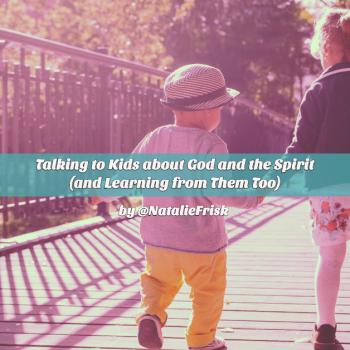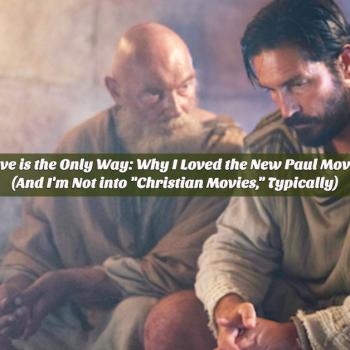[This article originally appeared in the Spring | Summer 2014 Journal (Vol. 12.1) Conversations: A Forum for Authentic Transformation. This particular volume’s theme was “Wisdom and Aging” and offered several pieces on spiritual transformation from across the generational spectrum. I can’t recommend picking up a copy of this issue enough!]
I was on the edge of giving up – deserted, doubtful, depressed, and done. At this point in my faith journey, I questioned everything: my trust in God, my love for the church, my mentoring relationships, and my call to ministry. Never had I considered the possibility that I wasn’t actually called to vocational ministry, but a turn of events within the context of the church left nothing off the table for scrutiny.
For the previous year, under the guidance of our church, my wife, Lauren, and I had discerned a call to plant a church in the city of Seattle. This choice came with much prayer and counsel, along with the blessing of our congregation. As one of the associate pastors on staff, I felt the sort of support that can only be described as ecstatic. We were not alone in the journey to come. Or so we thought.
After discerning that I might not be a theological fit for the community (I was seen as a bit too forward thinking), we were forced to part ways at the end of that fiscal year. (As a side note: we’ve reconciled and I still love that church!) This is where the word “deserted” comes in. Our community, full of great leaders who had mentored and shaped us both, said goodbye. We felt like rejects and wondered: If our mentors no longer believe in us, then perhaps our Seattle dream was more like a misguided fantasy.
This is where “doubtful” comes into the picture. We doubted our calling after having been in ministry for several years. When mentors seem to give up on you, it makes you want to give up on yourself. Of course, this led to “depression” at some level, which tempted us to finally relinquish our dreams and figure out how to live a normal life. Perhaps it was time to admit that we were “done.”
A MENTORING CRISIS
Many young leaders have stories to tell that are much more dramatic than what Lauren and I experienced in our late 20s. Too often mentorship becomes something like mold-er-ship: trying to create clones who create more clones is one of the crises of mentorship for the millennial generation. We long to become more fully human – more of who we were meant to be – not merely a younger version our mentor. What those of us in our 20s and early 30s (millennials) crave more than anything from spiritual and ministry mentors is safety. In most mentoring situations that go bad, the number one complicating factor usually comes down to the reality that a mentor was uncomfortable creating space for their mentee to safely ask questions, doubt, or even to disagree.
When safety presents itself within the context of spiritual mentorship, millennials open themselves up to the shaping influence of their mentors. We crave this from those who are more seasoned in life and ministry! Therefore, safety as the foundational posture of mentoring yields life-changing influence. The crisis of mentoring within the church is that some leaders with a few more years of experience under their belt fail to give themselves fully to the give-and-take of safety and influence. Adopting specific postures in mentoring relationships might begin to avert such a crisis.
POSTURES OF MILLENNIAL MENTORSHIP
Safety – the ability to create spaces where no questions or perspectives are off limits. As I’ve already noted, safety is the foundational posture of quality millennial mentorship. (I’m on the older end of the millennial spectrum.) Many of us yearn for seasoned saints who make asking questions and wrestling with difficult issues normative in our conversations about God and life. We millennials want to know that at a foundational level we have the freedom to create a future for the church that may look different from our parents’ experience. Where the continuity to the past comes in is that safety yields influence. Rarely will a millennial follower of Jesus disregard all things pertaining to their previous experiences. Many of us are quicker to integrate than dissipate our roots into who we are becoming. Millennials want the influence of the past insofar that it doesn’t create the boundaries of our future. Safety gives us the freedom to hold tradition and innovation together.
Authentic Modeling – showing mentees through their patterns of living that mentors walk what they talk. Some of the best mentors that I’ve had pattern their lifestyles in consistency with their spoken values. They don’t simply encourage a solid work ethic, for instance, but they show it. These mentors are the sorts that have a deep passion for living out the way of Jesus in everyday life, not out of obligation, but out of a sense of joy.
One person that played a mentoring role in my life was my grandfather. Parents and grandparents have an opportunity to model themselves after Jesus in such a way that their kids desire that same path for themselves. Grandpa was a man who had a simple faith in God, but God’s love radiated off him. Whether he was helping out someone with work or struggling with issues related to poverty or talking about how much he loved the daily company of Jesus, Grandpa authentically showed me glimpses of how to live a godly life. We didn’t always agree (let’s not even mention politics!), but we always held tightly to what mattered most: God’s love. He is no longer with us, but his impact on my life will be one that my daughter will grow up hearing about.
Life-Long Discovery – mentors who adapt, grow, change, and learn throughout their journey. Another mentor, Forrest, was my boss during my college internship in a youth ministry at a church. One thing that he instilled in me during those formative years is that “leaders are learners.” So, what did we do together? We read books! The very thing that was a chore during high school now became a necessary growth engine that would lead me into greater effectiveness as a future pastor. He was right. And although reading isn’t a natural way for me to pass the time, books have become foundational in my ongoing theological and pastoral development. Through mentors like Forrest I’ve become convinced that life-long learning and discovery is essential for discipleship. He modeled this sort of commitment and made it contagious.
Forrest, who remains a close friend, was on the younger end of the mentoring spectrum. (Yes, I have a lot of mentors in my life!) The idea of life-long discovery also exemplifies itself in some of my older mentors. Many of my seminary professors embodied this approach. They were not content to settle for the theological information given them during their education process, but continuously wrestled with fresh ideas. Mark, a professor and mentor, models this vision of personal development as he pushes me to ask hard questions about life, church, and God. Steve, a retired entrepreneur who has modeled a life-long transformation approach, has been another mentor. In his earlier life, he was committed to Jesus, but only in the past five years or so did he take spiritual formation to a whole new level. As a result, he now mentors several different leadership cohorts (one of which I am a part) in which he serves as a mentor and spiritual coach. As he learns, we learn. Life-long discovery in the lives of mentors gives them credibility in the millennial crowd. An unfinished life inspires us 20-30somethings to always move into new experiences of the life of God.
Mutuality – seeing mentoring as two-directional, as the mentee also influences the mentor. Mentoring relationships of this sort energize millennials. We don’t want to feel as though we have nothing to contribute. If any relationship isn’t a two-way street, we start to wonder if we are simply a means to building the ego of our so-called mentor. Now, of course this isn’t a hard and fast rule, but in interpersonal situations mutuality is our default. This is not a mutuality that fails to respect the elder party, but one in which we are free to both teach and be taught. We younger folks have something to teach older generations, but admittedly, we aren’t always good at articulating our ideas with tact or grace, which, perhaps, leads to the next posture of millennial mentoring: patience.
Patience – the ability to walk with a mentee for the long haul of the journey. Transformation should be more like a journey and less like an agenda item. One person who tried to play a mentoring role in my life (it didn’t work because of the crisis discussed above) implemented what he called “power meetings.” We had ten minutes to hash out issues with him, so as not to disrupt his busy day. In millennial mentoring, “power meetings” are like wearing socks with flip-flops – they just don’t go together. Mentoring is a relational commitment that involves one of life’s most precious commodities: time. We need mentors who are committed to our growth for the long haul, knowing that we will make poor choices along the way.
I learned this first-hand when I was a youth pastor. At times, even the students with the greatest potential for doing great things for God’s Kingdom failed to put into practice what they had learned in youth group. Mentoring meant bearing with them, both in their high moments and their lows. Sometimes there is a gap between what we believe and our maturity to act on these convictions. Millennials, like youth group kids, need mentors committed to the broad road of growth, with the grace to gently guide us when we stray off the path.
Intentionality – mentors who think through ways in which to help mentees grow into the most human versions of themselves. Mentoring, although not mechanical, ought to have some level of intention. What themes or ideas will be discussed regularly: spiritual journey, theology, sports, family, ministry, hobbies? In which ways will these conversations lead to potential growth? What are some next steps that may be helpful for the mentee? These are just some questions that might be helpful in guiding discussion times together.
Another one of my mentors, Bill, said something recently that demonstrated significant intentionality. He said: “Kurt, I love that you consider me and so many others as mentors. I think, however, that you have something to offer others. Who are you going to mentor?” By saying this, Bill pushed me to see that I have something to offer others that may be a step or two behind me in the journey. He wasn’t saying that maintaining mentors was a bad thing, but eventually we millennials need to start speaking into the lives of others as well. Since then, I have taken on a couple of mentees and hope to embody the postures of millennial mentorship, which I have presented, in these relationships.
5 THINGS TO NEVER SAY TO A MILLENNIAL MENTEE
1. “Some things are just off limits.” For a millennial, this means that we have to guard what we say or else face possible ridicule and rejection. This takes us back to the crisis of millennial mentoring; safety is the only means through which humanizing influence can take place. Without the freedom to talk about the taboo issues relating to God, life, or ministry, mentees look to other avenues for authentic dialogue. If a situation arises where the mentee needs someone trustworthy to process with (e.g. sex, family crises, past mistakes, etc.), if certain things are unmentionable, the younger person may not have anyone to offer them wisdom in their moment of need. The so-called relationship will plateau and never go into the depths of where Christ could take both the mentor and mentee.
2. “You’ve got to stop being so idealistic and start realizing that the real world doesn’t work that way.” Never say this to a millennial because in our inner being is the optimistic belief that we can in fact do great things for God on planet earth! Obviously, this is not an excuse for mentors to fail to interject rational thought into situations that mentees might face. Rationality should never, however, be taken to the extreme that would limit a mentee’s God-given potential. If the “real world” operates one way, then let’s change the “real world”! Pre-maturely putting water on the flames of idealism will limit the growth of a millennial and will draw us away from such mentoring relationships.
3. “Everything I know I learned during seminary, so I basically try to avoid reading because I did my time for three years in grad school.” Seriously? Three years in school made you an all-knowing guru? Saying this to a millennial only leads to a loss of credibility and a suspicion that perhaps this potential mentor is prideful. Also, it sends a big red flag our direction that this mentor will not likely have anything fresh to offer us as young leaders. Mentors that read, grow, and open themselves up to new insights are the influences that young people long for. These are the same sort of mentors that create the safety needed to wrestle with difficult issues as they emerge in culture and the church.
4. “I’ve got a way of doing and thinking about things that I hope you’ll get on board with.” What such a statement might imply is a “my way or the highway” sort of mentality. This should be obvious by now: a mentor that is single-minded will have difficulty influencing a millennial. Mutuality matters, even if the roles differ in the relationship. When equality of choice is lacking, the mentor becomes a mere dispenser of information rather than a means towards united transformation. The main objective of mentoring is to grow deeper into the life of God together. Without mutuality, one party will be limited in this process.
5. “I don’t know, maybe we can get together once in while, but I don’t have much to offer.” The problem with this line of thinking is that anyone who is a devoted follower of Jesus has something to offer in a mentoring relationship! Downplaying the ability of one to mentor might seem like humility, but it might also be a sign that one’s identity isn’t tied up in Christ. Someone whose character is being formed into greater Christlikeness is someone a younger person can learn from. We need more, not less, aged adults mentoring those of us in our 20s-30s.
5 THINGS MILLENNIALS LONG TO HEAR FROM THEIR MENTORS
1. “I want to journey with you for the long haul because I believe in you.” Millennials yearn for affirmation from seasoned saints. When Jesus called young fishermen to follow him, this meant that he believed in them, as he invited them to believe in him. Jesus saw the potential of Peter and the other disciples and drew it out in such a way that inaugurated a world-changing movement. Imagine the possibilities of mentors, filled with the Spirit of Christ, who believe in the potential of millennials. It could change our world!
2. “Don’t limit yourself to what seems realistic, but expect to discover new possibilities.” A life with God is a creative existence. Mentors that recognize the world as a place of possibilities rather than only rationalities excite millennials. Imagination is not lacking in 20-30somethings. We believe that God can use us to do great things for the Kingdom. What we need are mentors who see our potential and help guide it in a constructive direction. When we fail, we need encouragement. When we succeed, we need someone to celebrate with us. When we can’t see the way forward, we need someone to help us discern.
3. “Let’s come up with a mentoring rhythm tailored to your passions and gifts.” Rather than having an agenda, this approach to mentoring takes into account the whole person. Such a mentor not only models a life that is consistent with their own speech, but tailors what they are already living out in such a way that it fosters the passions and gifts of the mentee. Sometimes this will mean more than conversations over coffee or dinner, but will invite the mentor and mentee to serve together with their hands and feet. As the mentor models Jesus in a way that connects to the mentee, positive influence will be the natural result. Ultimately, the mentee will grow in their God-given identity fostering their innate abilities as the mentor customizes the process to the individual he or she is discipling.
4. “Nothing is off limits. We can talk about anything with an open mind.” Safety again comes back into view. Open minded mentors will influence millennial mentees more naturally than a mentor who is shocked at various points of conversation. Whether talking about struggles, theology, politics, sex, or any other heated conversation point, a mentor who is willing to hold his or her viewpoints with open hands will create space for mutual transformation. Again, each person involved has something to teach the other. Millennials want to know that they are not going to be rejected or disregarded just because they may have a perspective that is different from the mentor.
5. “I can’t wait to grow and learn with you! We have so much to learn from each other.” This final thing that millennial mentees long to hear from mentors fits with the previous. The point is that millennials want to know that they are on a journey with someone (who is older) and not traveling alone with a supposed mentor who thinks that they have already arrived. They also want to know that their mentors intentionally plan to stick around for the long haul, not for a short season. The dynamics of this friendship may change over time, but a commitment to growth will move both parties forward into new experiences in life and ministry.
A CRISIS AVERTED
Although I found myself at the edge of giving up, I didn’t. I questioned everything about my calling into pastoral ministry and church planting, but in the end, we moved to Seattle and started a church. If I were to boil it all down, the one thing that saw me through one of the darkest moments of my twenties was mentorship. I had several mentors that told me not to give up. One in particular, Jeff (my church planting coach), looked me in the eyes and said: “Kurt, you are called. You are gifted. Don’t give up.” As a result of mentoring relationships, Lauren and I continued to pursue our church planting dreams, and during the summer of 2013, that dream became a reality. Without mentors in my life that believed in me, I honestly think that I would have given up on ministry all together.
In the church many crises need to be averted. Many 20-30somethings simply need mentors that embody the postures of millennial mentorship to move from disappointment into their potential for God’s Kingdom. Whether it be ministry or some other calling, young adults long for older adults to come alongside them in the journey so that transformation can be unleashed. When this happens, there’s no limit to what God will do in this generation.













